| Listing 1 - 10 of 12 | << page >> |
Sort by
|
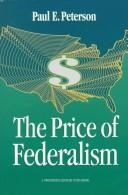
ISBN: 0815770243 0815770235 9780815770237 Year: 1995 Publisher: Washington, D.C. Brookings Institution
Abstract | Keywords | Export | Availability | Bookmark
 Loading...
Loading...Choose an application
- Reference Manager
- EndNote
- RefWorks (Direct export to RefWorks)
What level of government should be responsible for welfare, education, transportation, and other programs? What are the proper roles of the local, state, and national government? What price do we pay for our federal system? Does federalism perpetuate social inequality? Does it stifle economic growth? More intensely than ever, these questions are at the center of ongoing debate in Congress, statehouses, and town meetings. In this important book, Paul E. Peterson, one of the nation's leading experts on urban problems and American government, addresses them by bringing together two theoretical perspectives on federalism: functional and legislative. He uses these perspectives to explain the changes in federalism that have occurred over the past thirty-five years and to examine the proposals included in the Republican "Contract with America." After showing how both theories help explain American federalism, Peterson concludes that the federal system has been evolving in a functional direction. As the costs of transportation and communication have declined, labor and capital have become increasingly mobile, placing states and localities in greater competition with one another. State and local governments are responding to these changes by overlooking the needs of the poor and focusing instead on economic development. Meanwhile, the national government has concentrated on social welfare policy. From this perspective, Peterson evaluates the Republican "Contract with America." He applauds its commitment to decentralizing transportation, education, and other basic services to state and local government. But he says that passing the responsibility for welfare to the states would only induce among them a "race to the bottom."
Political systems --- United States --- Administration fédérale --- Autorités fédérales --- Coordination des politiques entre gouvernement fédéral et États fédérés --- Division des pouvoirs entre gouvernement fédéral et États fédérés --- Division of powers --- Federal government --- Federal government -- Law and legislation --- Federal state --- Federal systems --- Federal-provincial relations --- Federal-state relations --- Federale regering --- Federale regeringsvorm --- Federale staat --- Federale staat -- Recht en wetgeving --- Federalism --- Federalisme --- Fédéral [Gouvernement ] --- Fédéralisme --- Gouvernement central (État fédéral) --- Gouvernement fédéral --- Gouvernement fédéral -- Droit et législation --- Harmonisation des politiques entre gouvernement fédéral et États fédérés --- Pouvoir fédéral --- Pouvoirs [Division des ] entre gouvernement fédéral et États fédérés --- Relations gouvernement fédéral-États fédérés --- Relations États fédérés-gouvernement fédéral --- Système fédéral --- État fédéral --- États fédérés et gouvernement fédéral --- Federal government. --- #SBIB:328H31 --- #SBIB:324H40 --- #SBIB:HIVA --- Instellingen en beleid: VSA / USA --- Politieke structuren: algemeen --- States' rights (American politics) --- Powers, Division of --- Provincial-federal relations --- State-federal relations --- Political science --- Central-local government relations --- Decentralization in government --- Law and legislation --- Federal government - United States --- United States of America
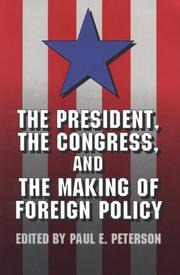
ISBN: 080612654X 080612685X 0585170843 9780806126852 9780806126548 Year: 1935
Abstract | Keywords | Export | Availability | Bookmark
 Loading...
Loading...Choose an application
- Reference Manager
- EndNote
- RefWorks (Direct export to RefWorks)
"What better time... to examine again the relative power of the president and Congress in the conduct of international affairs. This collection of essays is excellent for that purpose. Focusing on 1965-1990... the essays are instructive and engaging". -- Choice. "Few works to date have done a more thorough job of looking at inter-branch conflicts in foreign affairs from a Congressional perspective. Peterson's book is highly recommended". -- Presidential Studies Quarterly.
Etats-Unis. Congress --- United States. Congress --- Verenigde Staten. Congress --- Presidents --- -327 <73> --- 342.51 <73> --- Presidency --- Heads of state --- Executive power --- United States --- Foreign relations. --- United States. --- Foreign relations --- 327 <73> --- Presidents - United States --- United States - Foreign relations --- Political Science --- UNITED STATES --- PRESIDENTS --- POLITICAL SCIENCE --- BIOGRAPHY & AUTOBIOGRAPHY --- United states --- Political science --- Biography & autobiography
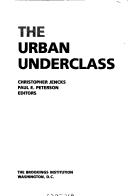
ISBN: 0815746059 0815746067 9780815746058 Year: 1991 Publisher: Washington, D.C. Brookings Institution
Abstract | Keywords | Export | Availability | Bookmark
 Loading...
Loading...Choose an application
- Reference Manager
- EndNote
- RefWorks (Direct export to RefWorks)
Urban poor --- African Americans --- Inner cities --- Urban policy --- Economic conditions. --- Social conditions. --- Economic conditions --- Social conditions --- United States --- Race relations. --- Race question --- #SBIB:316.8H15 --- 316.344.2 --- 316.342.2 --- 316.342.2 Sociale klassen --- Sociale klassen --- 316.344.2 Socio-economische groepen --- Socio-economische groepen --- Welzijns- en sociale problemen: sociale ongelijkheid en armoede --- Social stratification --- Social problems --- Sociology of minorities --- Race relations --- Urban poor - United States. --- African Americans - Economic conditions. --- African Americans - Social conditions. --- Inner cities - United States. --- Urban policy - United States. --- United States of America
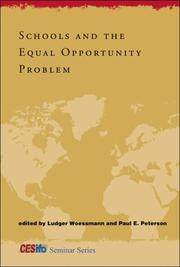
ISBN: 1282098977 9786612098970 0262286386 1429479698 0262292211 9780262286381 9781429479691 9781282098978 026223257X 9780262232579 661209897X 9780262292214 Year: 2007 Publisher: Cambridge, Mass. MIT Press
Abstract | Keywords | Export | Availability | Bookmark
 Loading...
Loading...Choose an application
- Reference Manager
- EndNote
- RefWorks (Direct export to RefWorks)
Leading researchers from the United States and Europe report on new findings on the effect of education on equal opportunity, using economic and statistical techniques to assess the results of education policy reform in countries including the United Stat.
Educational equalization --- Educational change --- Equality --- Egalitarianism --- Inequality --- Social equality --- Social inequality --- Educational inequality --- Equal education --- Equal educational opportunity --- Equalization, Educational --- Political science --- Sociology --- Democracy --- Liberty --- Education --- Affirmative action programs in education --- Aims and objectives --- Educational equality --- Educational equity --- Equality of education --- Equity, Educational --- Inequality, Educational --- Opportunity, Equal educational --- ECONOMICS/Political Economy --- SOCIAL SCIENCES/Political Science/Public Policy & Law --- Congresses --- Educational equalization - United States - Congresses --- Educational change - Europe - Congresses --- Educational change - United States - Congresses --- Equality - Europe - Congresses --- Equality - United States - Congresses --- Educational equalization - Europe - Congresses
Book
ISBN: 0262270110 1435694074 0262309254 9780262270113 9781435694071 9780262033763 0262033763 Year: 2009 Publisher: Cambridge, Mass. MIT Press
Abstract | Keywords | Export | Availability | Bookmark
 Loading...
Loading...Choose an application
- Reference Manager
- EndNote
- RefWorks (Direct export to RefWorks)
This volume analyses and studies public-private partnerships in education and the varied forms they take in different parts of the world, for example it studies publicly-funded vouchers in Chile and Columbia and private schools in India.
School choice --- Public schools --- Charter schools --- Education and state --- Chartered schools --- Common schools --- Grammar schools --- School funds --- Secondary schools --- Choice of school --- Parents' choice of school --- School, Choice of --- Schools --- Selection --- Grant-maintained schools --- Privatization in education --- Education --- ECONOMICS/General --- EDUCATION/General --- Cross-cultural studies --- School choice - Cross-cultural studies --- Public schools - Cross-cultural studies --- Charter schools - Cross-cultural studies --- Education and state - Cross-cultural studies
Book
ISBN: 331958930X 3319589318 Year: 2018 Publisher: Cham : Springer International Publishing : Imprint: Palgrave Macmillan,
Abstract | Keywords | Export | Availability | Bookmark
 Loading...
Loading...Choose an application
- Reference Manager
- EndNote
- RefWorks (Direct export to RefWorks)
This book explores the application of Scalia’s textualism and originalism to education law and reflects upon Scalia’s teachings and his pedagogy. Education law may seem to be an odd vehicle for considering Scalia’s constitutional approach, but thinking about schools requires attention to political fundamentals—freedom of speech, free exercise of religion, equality of opportunity, federalism, and the proper role of the expert. Legal scholars, philosophers, and political scientists provide both critiques and apologies for Scalia’s approach.
Education --- Law --- Judicial opinions --- Scalia, Antonin. --- Anglo-American law --- Law, Anglo-American --- United States-Politics and gover. --- Constitutional law. --- Political science --- Cultural policy. --- US Politics. --- Educational Policy and Politics. --- Constitutional Law. --- Political Philosophy. --- Cultural Policy and Politics. --- Intellectual life --- State encouragement of science, literature, and art --- Culture --- Popular culture --- Political philosophy --- Constitutional law --- Constitutional limitations --- Constitutionalism --- Constitutions --- Limitations, Constitutional --- Public law --- Administrative law --- Philosophy. --- Government policy --- Interpretation and construction --- United States—Politics and government. --- Educational policy. --- Education and state. --- Political philosophy. --- Education policy --- Educational policy --- State and education --- Social policy --- Endowment of research --- America --- American Politics. --- Politics and government.
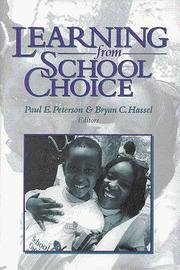
ISBN: 0815770154 Year: 1998 Publisher: Washington (D.C.): Brookings institution
Abstract | Keywords | Export | Availability | Bookmark
 Loading...
Loading...Choose an application
- Reference Manager
- EndNote
- RefWorks (Direct export to RefWorks)
Charter schools --- Educational vouchers --- School choice --- Case studies --- Case studies --- Case studies
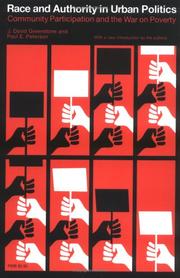
ISBN: 0226307131 Year: 1976 Publisher: Chicago (Ill.): University of Chicago press
Abstract | Keywords | Export | Availability | Bookmark
 Loading...
Loading...Choose an application
- Reference Manager
- EndNote
- RefWorks (Direct export to RefWorks)
Community organization --- Community power --- Economic assistance, Domestic --- Poor --- Case studies --- Case studies --- Case studies
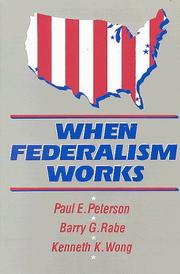
ISBN: 0815770197 0815770200 Year: 1986 Publisher: Washington, D.C. Brookings Institution
Abstract | Keywords | Export | Availability | Bookmark
 Loading...
Loading...Choose an application
- Reference Manager
- EndNote
- RefWorks (Direct export to RefWorks)
Federalisme --- #SBIB:328H31 --- #SBIB:35H6030 --- #SBIB:324H40 --- Instellingen en beleid: VSA / USA --- Bestuur en beleid: nationale en regionale studies: Verenigde Staten --- Politieke structuren: algemeen --- Federalisme. --- Sociology of minorities --- Social policy --- Sociology of environment --- Internal politics --- United States --- Federal government --- Grants-in-aid --- Intergovernmental fiscal relations --- Economic policy --- States' rights (American politics) --- United States of America
Book

Year: 2020 Publisher: Cambridge, Mass. National Bureau of Economic Research
Abstract | Keywords | Export | Availability | Bookmark
 Loading...
Loading...Choose an application
- Reference Manager
- EndNote
- RefWorks (Direct export to RefWorks)
Rising inequality in the United States has raised concerns about potentially widening gaps in educational achievement by socio-economic status (SES). Using assessments from LTT-NAEP, Main-NAEP, TIMSS, and PISA that are psychometrically linked over time, we trace trends in SES gaps in achievement for U.S. student cohorts born between 1961 and 2001. Gaps in math, reading, and science achievement between the top and bottom quartiles of the SES distribution have closed by 0.05 standard deviations per decade over this period. The findings are consistent across alternative measures of SES and subsets of available tests and hold in more recent periods. At the current pace of closure, the achievement gap would not be eliminated until the second half of the 22nd Century.
| Listing 1 - 10 of 12 | << page >> |
Sort by
|

 Search
Search Feedback
Feedback About UniCat
About UniCat  Help
Help News
News